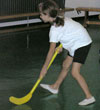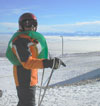The Physical Education (PE) programme helps students discover the capabilities
of their bodies and the variety of ways in which they are able to use
their bodies to solve problems, address physical challenges, function
as part of a group, manipulate equipment or apparatus and express themselves
kinesthetically in a range of situations. Students will be exposed to
a number of activities, which will develop motor skills that may later
be applied to various sports. They will become aware of a number of positive
leisure time pursuits. Students will be introduced to a healthy and active
lifestyle and the ways exercise affect their bodies and overall fitness
or well-being.
Students will develop skills, which they may apply in a variety of contexts
within and beyond the school setting. These skills include the use of
proper safety precautions when engaging in physical activities, recognition
of the importance of fair play, use of cooperative behaviours and the
ability to function as part of a team.
The following
expectations are arranged into seven strands: body control and spatial
awareness, adventure activities, athletics, movement to music, games,
gymnastics and health-related activities.
The PE Curriculum consists of the following units:
|
Early childhood
|
Adventure challenge | Explore
and develop the ability to solve tasks individually Explore and develop the ability to solve tasks in pairs or in small groups |
| Body control and spatial awareness | Develop
spatial awareness Develop gross motor skills Develop creative skills through movement |
|
| Games | Explore
coordination, manipulation and balance Travel in different ways maintaining body control Change speed and direction of movement maintaining body control Handle small equipment using various body parts Participate in, and follow instructions for, simple games requiring little or no equipment |
|
| Gymnastics | Learn
a variety of movements to form a basic movement vocabulary, for example
jump, hop, slide, rock Explore different ways of moving on the floor and on apparatus Create small movement patterns Hold their body weight in stillness using various body parts as bases Be introduced to one or two basic skills Explore different ways of moving with small equipment |
|
| Health-related activities | Be
aware of some of the elements of a healthy lifestyle Be aware that it is important to be physically active Recognize some basic changes that occur to their bodies when exercising Be made aware of safety aspects when exercising |
|
| Movement
to music |
Explore
locomotor skills using music as a stimulus |
|
| Years 1 - 2
|
Adventure
challenge |
By
the end of Year 2 students will: |
| Body control and spatial awareness | Develop
an awareness of space, direction and levels in relation to others
and to their working environment Hold their body weight various body parts as bases (balance and stability) |
|
| Games | Develop
coordination, manipulation and balance Travel in different ways, changing speed and direction while maintaining body control Explore small equipment using various body parts Participate in, and follow instructions for, simple games requiring little or no equipment |
|
| Gymnastics | Develop
the traditional gymnastic skills, involving physical agility, flexibility,
strength and coordination Interpret and answer movement tasks in their own way, and at their own ability level, on the floor and using apparatus |
|
| Health-related activities | Recognize
the elements and the benefits of a healthy lifestyle Become aware of the importance of physical activities in daily life Recognize basic changes that occur to their bodies when exercising Demonstrate safety |
|
| Movement to music | Combine
locomotor and non/locomotor skills in order to develop rhythmic responses Respond through movement to a range of stimuli Express feelings and moods using imagination and original ideas Master a dance containing basic step patterns, which has a beginning, middle and end |
|
|
Years 3 - 4
|
Invasion
Games* Movement and Dance Gymnastics Athletics Being Healthy (participation in Ski Days) |
|
|
Years 5 - 6
|
Invasion
Games* Gymnastics Dance Health and Fitness Athletics (track & field) (participation in Ski Days) |
|
|
|
Invasion Games* involves a team working together to attack a goal or target which is defended by another team; for example: soccer, basketball, handball, hockey and touch rugby. | |
| It is advised that all children also attend swimming lessons when they are offered. | ||
At Pregny: PE is taught indoors in the gym at Pregny or outdoors on the field or small all-weather surface court. At Saconnex: All
students should be prepared for both indoor and outdoor lessons.
For safety reasons, we ask children to remove all jewelry, including
watches before doing PE - please ensure your child is able to do
this (or remove it before arriving at school). |
||

| Demonstrations of deeper learning in responsible behaviour through positive action and service; a manifestation in practice of the other essential elements | Powerful ideas which have relevance within and across the disciplines and which students must explore and re-explore in order to develop understanding | Significant, relevant, subject matter which students are expected to explore and know about Click here to find out more about the 6 themes Click here to find out more about the 6 subject areas
| Those things which the students need to be able to do to succeed in a changing, challenging world | Dispositions which are expressions of fundamental values, beliefs and feelings about learning, the environment and people |
updated 25 March 2007



